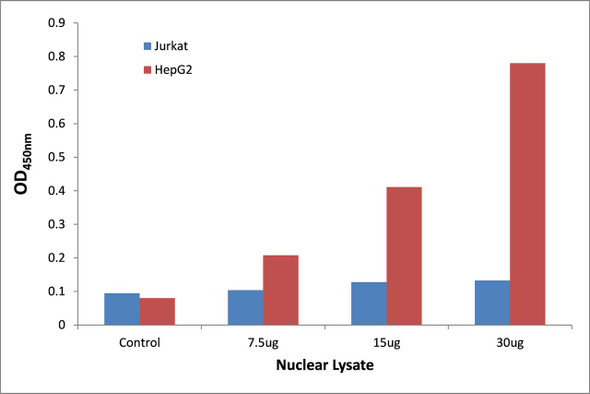Description
system_update_altDatasheet
| Product Name: | Smad3 (Phospho-Ser213) Transcription Factor Activity Assay |
| Product Code: | TFAB00064 |
| Target: | Smad3 (Phospho-Ser213) |
| Synonyms: | JV15-2, SMAD family member 3, SMAD 3, Smad3, hSMAD3 |
| Reactivity: | Human, Mouse, Rat |
| Sample Types: | Nuclear or cell lysates |
The Assay Genie Smad3 (Phospho-Ser213) transcription factor activity assay allows for the detection and qualitative analysis of Smad3 (Phospho-Ser213) active transcription factors in eukaryotic nuclear or cell lysates.
Assay Genie ELISA kits are designed to significantly reduce experiment time and ensure sensitivity and flexibility for high-throughput screening.
| Assay Time: | 4.5 hours |
| Detection Method: | Colorimetric 450 nm |
| Size: | 12 x 8-Well Microstrips |
| Storage: | 4°C for 6 months |
| UniProt Protein Function: | Receptor-regulated SMAD (R-SMAD) that is an intracellular signal transducer and transcriptional modulator activated by TGF-beta (transforming growth factor) and activin type 1 receptor kinases. Binds the TRE element in the promoter region of many genes that are regulated by TGF-beta and, on formation of the SMAD3/SMAD4 complex, activates transcription. Also can form a SMAD3/SMAD4/JUN/FOS complex at the AP-1/SMAD site to regulate TGF-beta-mediated transcription. Has an inhibitory effect on wound healing probably by modulating both growth and migration of primary keratinocytes and by altering the TGF-mediated chemotaxis of monocytes. This effect on wound healing appears to be hormone-sensitive. Regulator of chondrogenesis and osteogenesis and inhibits early healing of bone fractures. Positively regulates PDPK1 kinase activity by stimulating its dissociation from the 14-3-3 protein YWHAQ which acts as a negative regulator. |
| NCBI Summary: | The protein encoded by this gene belongs to the SMAD, a family of proteins similar to the gene products of the Drosophila gene 'mothers against decapentaplegic' (Mad) and the C. elegans gene Sma. SMAD proteins are signal transducers and transcriptional modulators that mediate multiple signaling pathways. This protein functions as a transcriptional modulator activated by transforming growth factor-beta and is thought to play a role in the regulation of carcinogenesis. [provided by RefSeq, Apr 2009] |
| UniProt Code: | P84022 |
| NCBI GenInfo Identifier: | 51338669 |
| NCBI Gene ID: | 4088 |
| NCBI Accession: | P84022.1 |
| UniProt Secondary Accession: | P84022,O09064, O09144, O14510, O35273, Q92940, Q93002 A8K4B6, B7Z4Z5, B7Z6M9, B7Z9Q2, F5H383, |
| UniProt Related Accession: | P84022 |
| Molecular Weight: | 25,722 Da |
| NCBI Full Name: | Mothers against decapentaplegic homolog 3 |
| NCBI Synonym Full Names: | SMAD family member 3 |
| NCBI Official Symbol: | SMAD3 |
| NCBI Official Synonym Symbols: | LDS3; LDS1C; MADH3; JV15-2; HSPC193; HsT17436 |
| NCBI Protein Information: | mothers against decapentaplegic homolog 3 |
| UniProt Protein Name: | Mothers against decapentaplegic homolog 3 |
| UniProt Synonym Protein Names: | JV15-2; SMAD family member 3; SMAD 3; Smad3; hSMAD3 |
| Protein Family: | Mothers against decapentaplegic |
| UniProt Gene Name: | SMAD3 |






